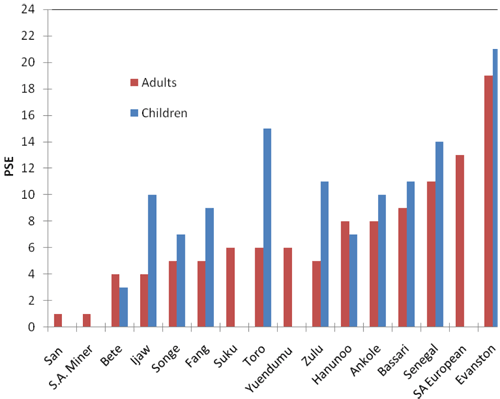See that's where I get tripped up. Who are "we" in this case. "Our" case? Whose case?
I don't see how you get tripped up by this part. In this conversation, "we" would refer to American society. I thought this would be obvious, since a large majority of posters on this site are Americans and it's something of an assumed default, unless otherwise stated.
When I hear someone mention "society" I immediately go to a place where the fact that women are photoshopped a certain way it shapes how we view beauty. Or when People's sexiest 100 list comes out it's full of skinny beautiful people. That to me is active. It's almost manipulative. That's why I have an issue with the idea that society shapes our preferences in some way. I don't buy it.
It's certainly
part of the description of society, but not the entirety. I think of "society", at least as used in this context, to be interchangeable with "culture."
The first part of your post doesn't speak to the effect of society on an individual. That's environment. The reason that someone would be attracted to a person with black teeth is because they don't know otherwise. I don't think that's "society". I just feel like using that word hurts the conversation because it implies that we are all being manipulated and told what to like in some small (or large) way and, again, I don't buy that.
No, no. I don't mean black teeth as in, "Every one you know has awful dental hygiene and has rotting teeth." I'm talking about something like the tradition of ohaguro, which was popular in Japan through the Meiji era. It was not that the Japanese had never seen white teeth before, which is a ridiculous assertion if you think about it.
Why is it that the Japanese (and perhaps only certain social classes, at that) have a nearly 700 year long history of using ohaguro, which was only outlawed in the 1870s during a period of modernization (and adoption of at least some Western values), while there isn't (to my knowledge!) a history of appreciation for blackened teeth in Western societies? There's nothing inherently "natural" or "inevitable" that Japanese people would find this attractive and we wouldn't, after all.
Why is it that in American society, the standards for both men and women's bodies have changed immensely over the last century? Why is it that men who went to the gym, who exercised regularly in an attempt to build their muscles as an end in itself (as opposed to doing so for some other end such as athletics)
These are all examples of the way societal attitudes towards beauty or attractiveness can change. Japanese attitudes changed (albeit forcibly) in the Meiji Era; American attitudes started changing as bodybuilding was legitimized by fitness stars like Eugen Sandow and Charles Atlas. Atlas in particular helped to change the perception of bodybuilding by presenting it as essential to the performance of heterosexual masculinity (defend your girlfriend's (and your own) honor at the beach!), rather than being indicators of subliminated homosexual desire, or at least narcissism.
We
are all being manipulated, told what to like in small and large ways. When we talk about society in this context, we're talking about culture. Your cultural context informs your views about almost everything; it can even affect how you view optical illusions:
In an experiment, the line on the left was extended until the viewer saw them as equal length. The effect varied greatly depending on culture; some cultures hardly saw a difference, while Americans needed the line on the left to be particularly exaggerated in order to perceive it as the same length as the line on the right. "PSE" refers to the percentage the line had to be extended:
I'm not sure why you're so resistant to the idea that aspects of what you find attractive are driven by cultural conditioning, or if it's just the word "society" that's throwing you for some reason.
I'm not attracted to certain women that are considered "beautiful" by most standards. ScarJo and Sophia V do nothing for me. Did "society" fail me? Shouldn't I be attracted to these women? That's my disconnect. I just don't think it's so easy to determine how and why we are attracted to certain people and not others. It's not something we'll likely ever understand.
I don't think it's just a matter of "Society says X, everyone agrees with X,"
I just think people like what they like and ignore the rest. And it goes a bit deeper than this conversation suggests.
I think there's a difference between not finding individual white women attractive, and not finding any white women attractive, or saying you think that white women are generally unattractive even if there might be some exceptions.
And I don't think it's easy to determine individually why we're attracted to certain people and not others. We probably won't ever completely know the vagaries of individual attractions. But I'm not arguing that I can do that; I'm arguing that the society you live in - your culture - is, if not determinative (after all, it's possible to resist cultural messaging by being aware of it instead of passively absorbing it), then at the very least highly influential in what you ultimately find attractive in men or women.



